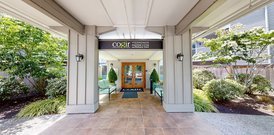Approximately 22% of Washington residents have health coverage through Medicaid, the federally mandated program that provides low-income seniors, children and adults with disabilities with primary, emergency, acute and long-term health services.
Washington’s Medicaid program is known as Apple Health, and eligibility is based on age, income and personal assets. To qualify for long-term Apple Health coverage, seniors 65 and older can earn up to $2,313 per month ($4,626 per married couple) and own up to $2,000 in countable assets ($3,000) per couple.
All types of income are included in Medicaid limits. Some assets are exempt, such as an owner-occupied home worth up to $585,000, a personal vehicle, clothing and household furnishings and an irrevocable burial trust.
Special rules apply when only one spouse in a married couple is seeking Medicaid coverage. In this situation, the non-applicant spouse, known as the community spouse, can collect up to $3,160.50 per month in income which may be either partially or fully transferred from the applicant spouse without penalty.
The community spouse can also keep up to $126,420 worth of the couple’s joint assets under the community spouse resource allowance clause.
Apple Health Medically Needy and Spend-down
Seniors with excess incomes and high ongoing medical costs may be eligible for Apple Health coverage through the Medically Needy and Spend-down programs.
Under the MN without spend-down path, qualified applicants may be provided with up to 12 months of Apple Health coverage without incurring any out-of-pocket medical costs.
MN with spend-down lets applicants enroll in Apple Health for either a 3- or 6-month term. Once the applicant has reached the predetermined spend-down amount for each period (similar to paying a deductible on a private insurance policy), MN Apple Health coverage is provided for the remainder of the term.
Long-Term Care Services Hardship Waivers
Apple Health may provide a hardship waiver in special cases where a senior has been denied long-term care services through Medicaid due to excess home equity or a transfer-of-asset penalty.
An undue hardship waiver may be considered if a senior is unable to obtain food, clothing or shelter or is experiencing life-threatening circumstances due to a lack of medical care and support services.
Community Options Program Entry System
The Community Options Program Entry System is a Medicaid home and community-based waiver designed to delay or prevent nursing home placement by providing additional services to seniors within an assisted living setting.
To qualify, seniors must need help with at least two activities of daily living such as bathing, eating, getting dressed, using the toilet or navigating their environment. COPES services are assigned based on medical need and may include:
- Adult day health programming
- Minor home modifications to improve safety and accessibility
- Skilled and intermittent nursing
- Medical supplies and mobility aids
- Medical transportation
- Ongoing case management
- Access to a personal emergency response system
Note that as a Medicaid waiver program, statewide enrollment limits are in effect, and qualified applicants may be placed on a waiting list.
Community First Choice Option Community First Choice Option is a Medicaid entitlement program available to seniors 65 and older who need the level of care normally provided in a nursing facility. CFCO funds community-based personal support services that let seniors safely age in place in an assisted living setting.
CFCO participants can choose their care provider and receive help with activities of daily living and medication management and transition from a nursing facility into a community-based residence.
Note that CFCO benefits can be combined with Medicaid waiver programs such as COPES.
To learn more about Apple Health enrollment, waivers and the CFCO, contact the Apple Health Customer Service Center at (800) 562-3022 or the
Snohomish County Long Term Care and Aging Program at (425) 388-7218.









